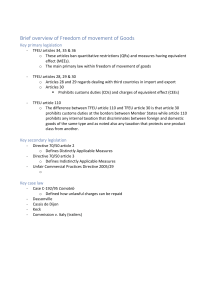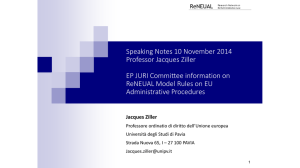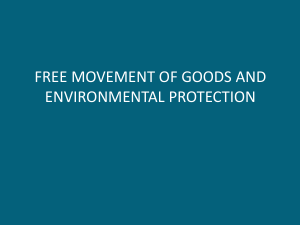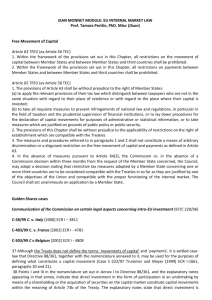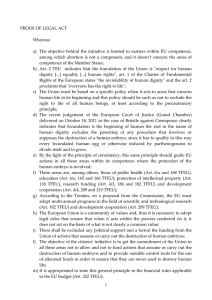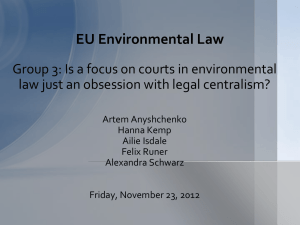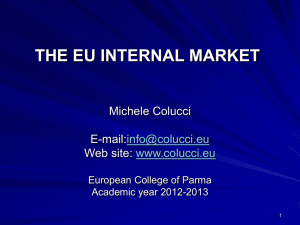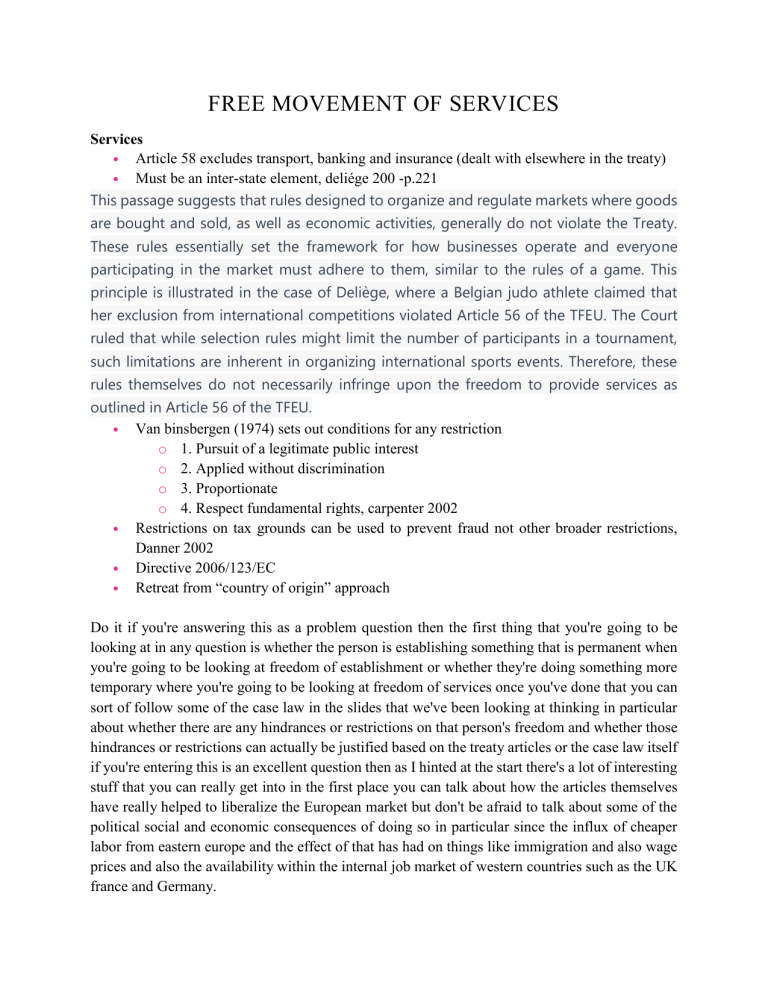
FREE MOVEMENT OF SERVICES Services • Article 58 excludes transport, banking and insurance (dealt with elsewhere in the treaty) • Must be an inter-state element, deliége 200 -p.221 This passage suggests that rules designed to organize and regulate markets where goods are bought and sold, as well as economic activities, generally do not violate the Treaty. These rules essentially set the framework for how businesses operate and everyone participating in the market must adhere to them, similar to the rules of a game. This principle is illustrated in the case of Deliège, where a Belgian judo athlete claimed that her exclusion from international competitions violated Article 56 of the TFEU. The Court ruled that while selection rules might limit the number of participants in a tournament, such limitations are inherent in organizing international sports events. Therefore, these rules themselves do not necessarily infringe upon the freedom to provide services as outlined in Article 56 of the TFEU. • Van binsbergen (1974) sets out conditions for any restriction o 1. Pursuit of a legitimate public interest o 2. Applied without discrimination o 3. Proportionate o 4. Respect fundamental rights, carpenter 2002 • Restrictions on tax grounds can be used to prevent fraud not other broader restrictions, Danner 2002 • Directive 2006/123/EC • Retreat from “country of origin” approach Do it if you're answering this as a problem question then the first thing that you're going to be looking at in any question is whether the person is establishing something that is permanent when you're going to be looking at freedom of establishment or whether they're doing something more temporary where you're going to be looking at freedom of services once you've done that you can sort of follow some of the case law in the slides that we've been looking at thinking in particular about whether there are any hindrances or restrictions on that person's freedom and whether those hindrances or restrictions can actually be justified based on the treaty articles or the case law itself if you're entering this is an excellent question then as I hinted at the start there's a lot of interesting stuff that you can really get into in the first place you can talk about how the articles themselves have really helped to liberalize the European market but don't be afraid to talk about some of the political social and economic consequences of doing so in particular since the influx of cheaper labor from eastern europe and the effect of that has had on things like immigration and also wage prices and also the availability within the internal job market of western countries such as the UK france and Germany. The freedom of services is a fundamental concept within the European Union that allows businesses and individuals to provide services across member states' borders. It ensures that service providers have the right to offer their services in any EU country without facing unjustified barriers or discrimination based on their nationality or origin. In simpler terms, the freedom of services means that if you're a service provider (like a company or a professional), you have the right to offer your services in any EU country just like you would in your own country. This helps create a single market for services within the EU, promoting competition, innovation, and choice. It benefits both service providers and consumers by increasing options and fostering economic growth. To answer the question of freedom of services it is important to start with understanding the concept of services and how it is different from establishes. The concept of establishes was given in the case law Gebhard: “The concept of establishment within the meaning of the Treaty is therefore a very broad one, allowing a [Union] national to participate, on a stable and continuous basis, in the economic life of a Member State other than his state of origin and to profit therefrom, so contributing to social and economic penetration within the [Union] in the sphere of activities as self-employed persons.” (Case C–55/94 Gebhard [1995] ECR I–4165, para. 25) and the court continued to know the difference the activity temporary nature must be determined “in the light, not only of the duration of the provision of the service but also of its regularity, periodicity or continuity”. (Case C–55/94 [1995] ECR I–4165, para. 27) As was further established by the court in Trojani where the court said a permanent activity, or at least one without a foreseeable end to its length, would not be covered by the services rules. (Case C–456/02 Trojani v. CPAS [2004] ECR I–7573, para. 28.) Therefore the distinguishing factor between services and establishment is primarily the duration of presence. If an individual remains in a foreign country on a permanent basis, they would typically be subject to regulations regarding establishing a business. Conversely, if their stay is only temporary, they are more likely engaged in providing services (p.296) The notion of freedom to temporarily provide services to a receiver established in another Member State is outlined in Articles 56-7 TFEU. Article 56(1) TFEU states: “Within the framework of the provisions set out below, restrictions on freedom to provide services within the Union shall be prohibited in respect of nationals of Member States who are established in a Member State other than that of the person for whom the services are intended.” (p.70) Therefore limitations on the ability to offer services on a temporary basis by an individual (union citizen) who is established in one Member state to recipient established in another Member state are prohibited. Article 57 TFEU gives a definition of services: “Services shall be considered to be ‘services’ within the meaning of the Treaties where they are normally provided for remuneration, in so far as they are not governed by the provisions relating to freedom of movement for goods, capital and persons. ‘Services’ shall in particular include: (a) activities of an industrial character; (b) activities of a commercial character; (c) activities of craftsmen; (d) activities of the professions. Without prejudice to the provisions of the Chapter relating to the right of establishment, the person providing a service may, in order to do so, temporarily pursue his activity in the Member State where the service is provided, under the same conditions as are imposed by that State on its own nationals.” (p.70) Article 57 TFEU defines what qualifies as "services" under the EU law. It also says that if someone wants to provide a service in another EU country, they can temporarily do so under the same conditions that the host country applies to its own citizens, the article provides equal treatment to the service providers. Services must be provided for remuneration. This rule was added to the Treaty to make sure that free services are not covered by its rules. As can be seen in Jundt (Case C–281/06 Jundt v. Finanzamt Offenburg [2007] ECR I–12231) a German lawyer living in Germany taught a course at a university in Strasbourg and got paid a modest amount. The Court saw him as a service provider according to Article 56 TFEU, even though the payment was small. The Court also explained that for the Treaty provision to come into play, the service provided shouldn't be entirely free, although the person offering the service doesn't have to be aiming to make money from it. (p.291) Therefore, there are three components to Article 57 TFEU: (1) services, (2) payment, and (3) temporary. Article 56 TFEU has a direct effect as it can be used to challenge and apply EU law directly against both the country where the service is being offered (host state, State B) and the country where the service provider is based (home state, State A) (p.287). An example of that can be seen in Van Binsbergen (Case 33/74 J.H.M. van Binsbergen v. Bestuur van de Bedrijfsvereniging voor de Metaalnijverheid [1974] ECR 1299.) Where Kortmann a Dutch citizen who lived in Belgium. He challenged a Dutch regulation which demanded that legal representatives had to be established in the country in order to represent someone in Dutch courts. The court determined that this was a breach of freedom of services and therefore a breach of Article 56 TFEU. Article 56-57 TFEU focus on that service providers can travel to offer services, it's logical that recipients of those services should also be allowed to travel to the provider's country. This was recognized in Directive 73/148 (Dir. 73/148/EEC [1973] OJ L172/14 on the Abolition of Restrictions on Movement and Residence). Where Article 1(b) stated that restrictions on the movement and residence of individuals who want to receive services in another EU country should be removed (p.288). As can be seen in the case of Luisi and Carbone, two people from Italy were fined for taking more money out of the country than allowed by currency rules. They did this to travel to other EU countries as tourists and to get medical treatment. The Court said that if you're allowed to offer services in another EU country, you should also be able to get services from there. Service providers have the rights of entry to the services market in other member states according to article 57 TFEU and there should be no discrimination against those who want to offer or receive services on the basis of nationality. As the court said in Säger: (Case C–76/90 [1991] ECR I–4221, para. 13.) “a Member State may not make the provision of services in its territory subject to compliance with all the conditions required for establishment and thereby deprive of all practical effectiveness the provisions of the Treaty whose object is, precisely, to guarantee the freedom to provide services.”. Therefore a member state cannot create rules and requirements for providing services that effectively undermine the core principle of free service provision that the Treaty aims to protect. This is benefits XX as if it engages in cross-border commerce they are prodected against any unreasonable obstacles, restrictions, or overly complicated regulations that would hinder XX ability to provide its products or services. This helps ensure that companies can benefit from the advantages of a single market, such as increased market access and business opportunities, without being unduly hampered by unnecessary barriers. With directive 73/148 it opens the pathway for customers, that is if a company is offering services across EU borders, it's not just about the company being able to travel and provide those services; it also involves ensuring that customers or clients from other EU countries can travel to the company's location to receive those services. This helps promote a more seamless experience for both service providers and their customers. This principle ensures a fair and reciprocal approach to cross-border commers, benefitting both businesses and their customers. Articles 56-57 TFEU can also be used when neither the person providing the service nor the person receiving it is actually traveling. Instead, if the service itself is being offered across borders. As can be seen in Alpine Investments where a Dutch company was told it couldn't make calls offering financial services to people in the Netherlands or other EU countries without written permission. The Court said that Article 56 of the EU Treaty covers services offered through phone calls to people in different EU countries, even if the provider doesn't go to those countries. (Case C–384/93 Alpine Investments [1995] ECR I–1141.) For a company engaged in cross-border commerce, this means that the freedom to provide services extends beyond physical presence. Even if the company doesn't send representatives to other EU countries, it should still be able to offer its services through various means, such as phone calls or online platforms, without facing unwarranted restrictions. This enables the company to reach a broader market and engage with customers across different EU countries without unnecessary obstacles. Article 56 TFEU protect against both direct and unjustified indirect discrimination which can only be saved by the express derogations. In the case. Gouda the court outlined the definition of the principle of direct discrimination: (Case C–288/89 Stichting Collectieve Antennevoorziening Gouda v. Commissariaat voor de Media [1991] ECR I–4007, para. 10) “Article [56 TFEU] entails, in the first place, the abolition of any discrimination against a person providing services on the grounds of his nationality or the fact that he is established in a Member State other than the one in which the service is provided.”. Article 56 TFEU thus does not only prevents discrimination based on nationality like other Treaty provisions but also prohibits discrimination based on the location where a person or business is established. As for indirect discrimination the court said that measures that place an additional burden on service providers from other countries go against Article 56 of the Treaty unless there are compelling reasons related to the public interest that can justify them. (p.299) As can be seen in Van Binsbergen (Case 33/74 [1974] ECR 1299.), the Court acknowledged that a Dutch rule demanding legal representatives to be residents of the Netherlands could be justified due to professional conduct standards related to the justice system. However, the Court found this requirement to be excessive because the proper functioning of the justice system could be achieved through less restrictive measures on freedom of services and therefore breached Article 56 TFEU. If non-discriminatory actions have the potential to restrict or obstruct access to the market, they do also, in theory, violate Article 56 TFEU. As can be seen the case of the Schindlers Case C–275/92 Schindler [1994] ECR I–1039 , who worked for SKL, a German organization that ran lotteries. They advertised a German lottery to people in the UK and were charged with breaking UK laws against lotteries. The Court determined that the German law restricting large lotteries affected the freedom to offer services and went against Article 56 of the TFEU. The court said in Säger that Article 56 requires: (Case C–76/90 Säger [1991] ECR I–4221, para. 12) “not only the elimination of all discrimination against a person providing services on the grounds of his nationality but also the abolition of any restriction even if it applies without distinction to national providers of services and to those of other Member States, when it is liable to prohibit or otherwise impede the activities of a provider of services established in another Member State where he lawfully provides similar services.” The aim with freedom of services is to remove any barriers that would prevent international service providers from conducting business in another EU country, even while the same restrictions also apply to local service providers, in addition to ensuring that all service providers receive fair treatment regardless of their nationality. The court also said in the case of Laval that host states cannot demand that temporary service providers and their employees meet all of the host state's labor standards when they have already met the standards in their home state. Requiring compliance with both sets of rules places an excessive burden on them, which would essentially nullify the effectiveness of Article 56 of the TFEU. (Case C–341/05 Laval [2007] ECR I–987.) These principles protect XX against both direct discrimination (being treated unfairly due to nationality or establishment in another EU country) and unjustified indirect discrimination. The company's ability to engage in cross-border commerce should be safeguarded, and any discriminatory measures that hinder its operations could potentially be in violation of Article 56 of the TFEU. In essence, for a company involved in cross-border commerce, Article 56 TFEU ensures that it can operate fairly and without unjustified obstacles when providing services across different EU countries. If host countries force temporary service providers and their staff to meet their own labor standards even though these providers are already following standards from their home country, it creates a heavy and unnecessary workload. This contradicts the purpose of Article 56 of the TFEU, which aims to ensure the freedom to provide services without undue obstacles. The company can expect that when providing services temporarily in another EU country, it won't be required to meet all of that country's labor standards if it already complies with similar standards in its home country. Measures that are indirect discriminatory and that restrict the provision of services across Member States can be justified. As said in Säger: (Case C–76/90 [1991] ECR I–4221, para. 15) “imperative reasons relating to the public interest and which apply to all persons or undertakings pursuing an activity in the State of destination, in so far as that interest is not protected by the rules to which the person providing the services is subject in the Member State in which he is established”. Meaning if there's a strong public interest reason for imposing certain rules on service providers in a different EU country, those rules can be acceptable as long as they are applied to all similarly situated providers in that country. However, these rules cannot be used to override or ignore the regulations that the service provider already complies with in their own home country. Direct and unjustified Indirect discrimination breaches Article 56 TFEU and can only be saved by one of the express derogations. Those express derogations can be seen in Article 52 TFEU and Article 62 TFEU. Article 52 TFEU states: -p.69 “1. The provisions of this Chapter and measures taken in pursuance thereof shall not prejudice the applicability of provisions laid down by law, regulation or administrative action providing for special treatment for foreign nationals on grounds of public policy, public security or public health. 2. The European Parliament and the Council shall, acting in accordance with the ordinary legis lative procedure, issue directives for the coordination of the abovementioned provisions.” And Article 62 TFEU states: -p.71 “The provisions of Articles 51 to 54 shall apply to the matters covered by this Chapter.” While the general principle is non-discrimination, certain regulations related to public policy, public security, or public health may apply differently to foreign nationals. The company should be aware of these exceptions to ensure compliance and mitigate potential conflicts. If the company faces challenges due to specific regulations or actions that might seem discriminatory, it can assess whether these actions fall under the express derogations in Article 52 and Article 62. These provisions provide a framework for justifying certain restrictions based on public policy or security concerns. In summary, these provisions ensure that a company engaged in cross-border commerce can expect fair treatment, while also recognizing that some exceptions may apply for valid reasons. The company should be well-informed about these provisions to navigate potential challenges and ensure compliance with EU regulations.

